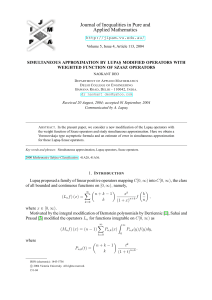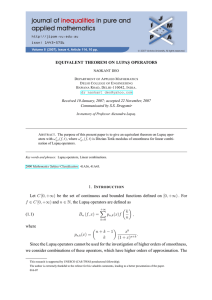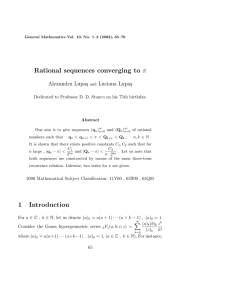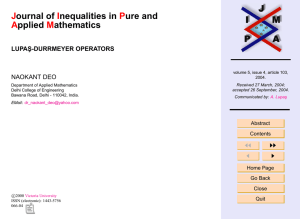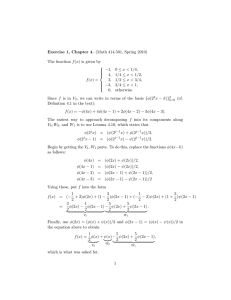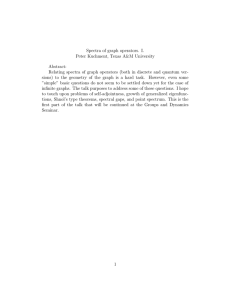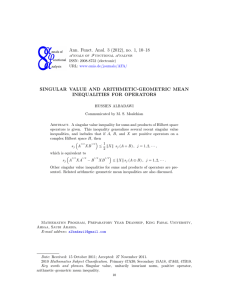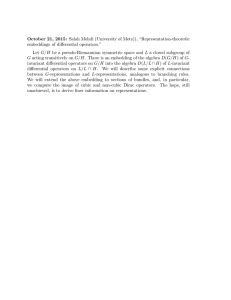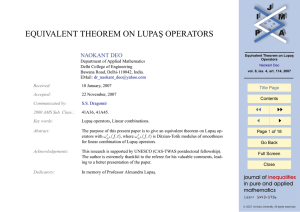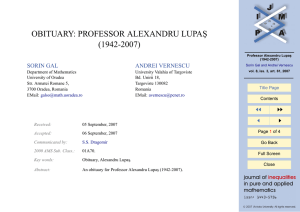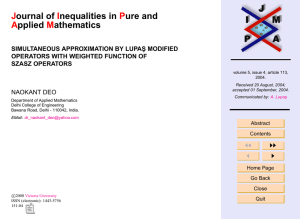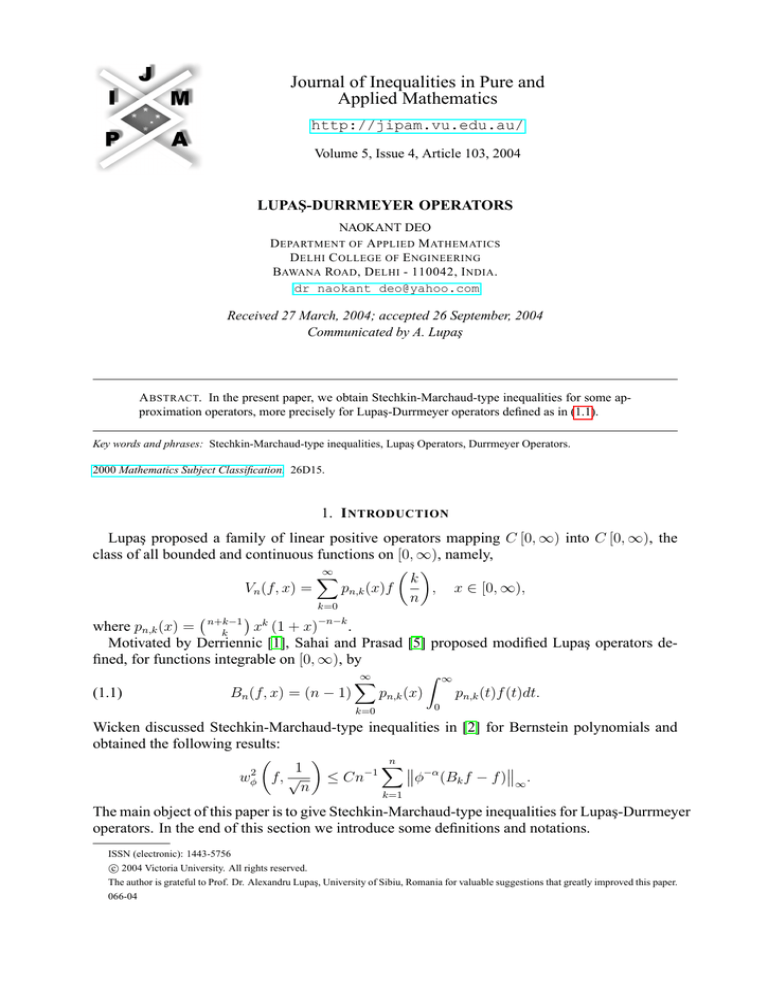
Journal of Inequalities in Pure and
Applied Mathematics
http://jipam.vu.edu.au/
Volume 5, Issue 4, Article 103, 2004
LUPAŞ-DURRMEYER OPERATORS
NAOKANT DEO
D EPARTMENT OF A PPLIED M ATHEMATICS
D ELHI C OLLEGE OF E NGINEERING
BAWANA ROAD , D ELHI - 110042, I NDIA .
dr_naokant_deo@yahoo.com
Received 27 March, 2004; accepted 26 September, 2004
Communicated by A. Lupaş
A BSTRACT. In the present paper, we obtain Stechkin-Marchaud-type inequalities for some approximation operators, more precisely for Lupaş-Durrmeyer operators defined as in (1.1).
Key words and phrases: Stechkin-Marchaud-type inequalities, Lupaş Operators, Durrmeyer Operators.
2000 Mathematics Subject Classification. 26D15.
1. I NTRODUCTION
Lupaş proposed a family of linear positive operators mapping C [0, ∞) into C [0, ∞), the
class of all bounded and continuous functions on [0, ∞), namely,
∞
X
k
Vn (f, x) =
pn,k (x)f
, x ∈ [0, ∞),
n
k=0
k
n+k−1
where pn,k (x) =
x (1 + x)−n−k .
k
Motivated by Derriennic [1], Sahai and Prasad [5] proposed modified Lupaş operators defined, for functions integrable on [0, ∞), by
Z ∞
∞
X
(1.1)
Bn (f, x) = (n − 1)
pn,k (x)
pn,k (t)f (t)dt.
k=0
0
Wicken discussed Stechkin-Marchaud-type inequalities in [2] for Bernstein polynomials and
obtained the following results:
n
X
−α
1
2
−1
φ (Bk f − f ) .
wφ f, √
≤ Cn
∞
n
k=1
The main object of this paper is to give Stechkin-Marchaud-type inequalities for Lupaş-Durrmeyer
operators. In the end of this section we introduce some definitions and notations.
ISSN (electronic): 1443-5756
c 2004 Victoria University. All rights reserved.
The author is grateful to Prof. Dr. Alexandru Lupaş, University of Sibiu, Romania for valuable suggestions that greatly improved this paper.
066-04
2
NAOKANT D EO
Definition 1.1. For 0 ≤ λ ≤ 1,
0 < α < 2r, 0 ≤ β ≤ 2r, 0 ≤ α(1 − λ) + β ≤ 2r
kf k0 = kf k0,α,β,λ = sup φα(λ−1)−β (x)f (x) ,
(1.2)
x∈I
(1.3)
0
Cα,β,λ
= {f ∈ CB (I), kf k0 < ∞} ,
(1.4)
kf kr = kf kr,α,β,λ = sup φ2r+α(λ−1)−β (x)f (2r) (x)
x∈I
and
r
Cα,β,λ
= f ∈ CB (I), f (2r−1) ∈ ACloc , kf kr < ∞ ,
(1.5)
where φ(x) =
p
x(1 + x) and r = 0, 1, 2, . . . .
Definition 1.2. Peetre’s K-functional is defined as
α(λ−1)−β
φ
sup
(x)∆2r λ f (x)
(1.6)
w2rλ (f, t)α,β = sup
φ
hφ
0<h≤t x±rhφλ (x)∈I
and
(1.7)
Kφλ (f, t2r )α,β =
inf
g (2r−1) ∈ACloc
kf − gk0 + t2r kgkr ,
where ACloc is the space of real valued absolute continuous and integrable functions on [0, 1].
In second section of the paper, we will give some basic results, which will be useful in proving
the main theorems; while in Section 3 the main results are given.
2. AUXILIARY R ESULTS
Some basic results are given here.
Lemma 2.1. Suppose that for nonnegative sequences {σn } , {τn } with σ1 = 0 the inequality
p
σ ≤ nk σk + τk , (1 ≤ k ≤ n), is satisfied for n ∈ N, p > 0. Then one has
σn ≤ Bp n
(2.1)
−p
n
X
k p−1 τk .
k=1
0
Lemma 2.2. For f (2s) ∈ Cα,β,λ
, s ∈ N0 , the following inequalities hold
(2s) Bn f ≤ C1 nr f (2s) ,
(2.2)
r
0
and
(2s) + β2 (2s) Bn f ≤ C2 nr+ α(1−λ)
2
f
.
r
∞
(2.3)
r
Lemma 2.3. For f (2s) ∈ Cα,β,λ
, s ∈ N0 , the following inequality holds
(2s) Bn f ≤ f (2s) .
(2.4)
r
r
0
Lemma 2.4. Let us suppose that f (2s) ∈ Cα,β,λ
, s ∈ N0 , 0 ≤ α(1 − λ) + β ≤ 2, then
!
n
X
(2s) Bn f ≤ C
(2.5)
k r−1 (Bk f − f )(2s) + f (2s) .
r
0
∞
k=1
J. Inequal. Pure and Appl. Math., 5(4) Art. 103, 2004
http://jipam.vu.edu.au/
L UPA Ş -D URRMEYER O PERATORS
3
1
Lemma 2.5. Suppose that r ∈ N, x ± rt ∈ I, 0 ≤ β ≤ 2r, 0 ≤ t ≤ 16r
, then
!
Z t
Z t
2r
X
2r
2r
−β
x+
φ
uj du1 · · · du2r ≤ C(β)t2r φ−β (x).
···
(2.6)
t
− 2r
t
− 2r
j=1
3. M AIN R ESULTS
We are now ready to prove the main results of this paper.
Theorem 3.1. For the modulus of smoothness and K-functional
!
n
X
1
(3.1)
Kφλ f (2s) , r
≤ Cn−r
k r−1 (Bk f − f )(2s) 0 + f (2s) ∞ ,
n α,β
k=1
1
n 2−λ
(3.2)
wφ2rλ
f
(2s)
1
,√
n
α,β
r−1 r X
≤ Cn− 2−λ
k − 2−λ (Bk f − f )(2s) 0 + f (2s) ∞ ,
k=1
where k·k∞ denotes the supremum norm.
Proof of (3.1). Taking n2 ≤ m ≤ n such that (Bm f − f )(2s) 0 ≤ (Bk f − f )(2s) 0 ,
( n2 < k ≤ n), we have
(2s) (2s) 1
Kφλ f , r
≤ (Bm f − f )(2s) 0 + n−r fm n α,β
r
n
2r X r−1 ≤ r
k (Bk f − f )(2s) 0
n
k= n
2
!
m
X
+ Cn−r
k r−1 (Bk f − f )(2s) + f (2s) ∞
0
k=1
≤ Cn
−r
n
X
!
k r−1 (Bk f − f )(2s) 0 + f (2s) ∞ .
k=1
Proof of (3.2). By definition of K-functional there exists g ∈ C r
such that
α,β,λ
(2s)
r
r
f
(3.3)
− g 0 + n− 2−λ kgkr ≤ Kφλ f, n− 2−λ
α,β
and
(3.4)
2r
∆hφλ (x) f (2s) (x) ≤ Cφα(1−λ)+β (x) f (2s) 0
1
by Lemma 2.5 for above g, 0 < hφλ (x) < 16r
, x ± rhφλ (x) ∈ I,
2r
(3.5)
∆
g(x)
hφλ (x)
≤ Ch2r φ(−2r+α)(1−λ)+β (x) kgkr .
1
Using (3.4) and (3.5), again for 0 < hφλ (x) < 16r
, x ± rhφλ (x) ∈ I, we get
2r
(2s)
(3.6)
∆hφλ (x) f (x) ≤ Cφα(1−λ)+β (x) f (2s) − g 0 + h2r φ2r(λ−1) (x) kgkr .
J. Inequal. Pure and Appl. Math., 5(4) Art. 103, 2004
http://jipam.vu.edu.au/
4
NAOKANT D EO
For x ± rhφλ (x) ∈ I , we obtain
2 2(λ−1)
hφ
(3.7)
1 1
(x) ≤ n 2−λ
2
−1
.
From (3.6) and (3.7) we have
(2s)
(3.8) ∆2r
f
(x)
λ
hφ (x)
−1 !
1
1
≤ Cφα(1−λ)+β (x)Kφλ f (2s) , n 2−λ
2
α,β
h r i
n 2−λ
r−1 r X
≤ Cφα(1−λ)+β (x)n− 2−λ
k − 2−λ (Bk f − f )(2s) 0 + f (2s) ∞ .
k=1
Corollary 3.2. If 0 < α < 2, f ∈ CB (I), then
|(Bn f )(x) − f (x)| = O (n−1/2 φ1−λ (x))α ⇒ wφ2 λ (f, t) = O(tα ),
where
wφ2 λ (f, t) = sup
sup
0<h≤t x±hφλ (x)∈I
This is the inverse part in [3].
In (1.4) and (1.5), for δn (x) = φ(x) +
√1 ,
n
2
∆ λ f (x) .
hφ
φ(x) replaced by δn (x), (3.1) also holds.
Corollary 3.3. If 0 < α < 2r, f ∈ CB (I), then
|(Mn f )(x) − f (x)| = O (n−1/2 φ1−λ (x))α ⇒ wφ2rλ (f, t) = O(tα ),
where (Mn f )(x) is linear combination of (Bn f )(x).
This is the inverse parts in [4].
Remark 3.4. We also propose some other modifications of Lupaş operators as
Z ∞
∞
X
Mn (f, x) = n
pn,k (x)
sn,k (t)f (t)dt
k=0
0
k
where sn,k (t) = e−nt (nt)
and pn,k (x)is defined in (1.1) for these operators Mn .
k!
R EFERENCES
[1] M.M. DERRIENNIC, Sur l’approximation de fonctions integrables sur [0, 1] par des polynomes de
Bernstein modifies, J. Approx, Theory, 31 (1981), 325–343.
[2] E. VAN WICKEN, Stechkin-Marchaud type inequalities in connection with Bernstein polynomials,
Constructive Approximation, 2 (1986), 331–337.
[3] M. FELTEN, Local and global approximation theorems for positive linear operators, J. Approx.
Theory, 94 (1998), 396–419.
[4] S. GUO, C. LI AND Y. SUN, Pointwise estimate for Szasz-type, J. Approx. Theory, 94 (1998), 160–
171.
[5] A. SAHAI AND G. PRASAD, On simultaneous approximation by modified Lupaş operators, J.
Approx., Theory, 45 (1985), 122–128.
J. Inequal. Pure and Appl. Math., 5(4) Art. 103, 2004
http://jipam.vu.edu.au/

